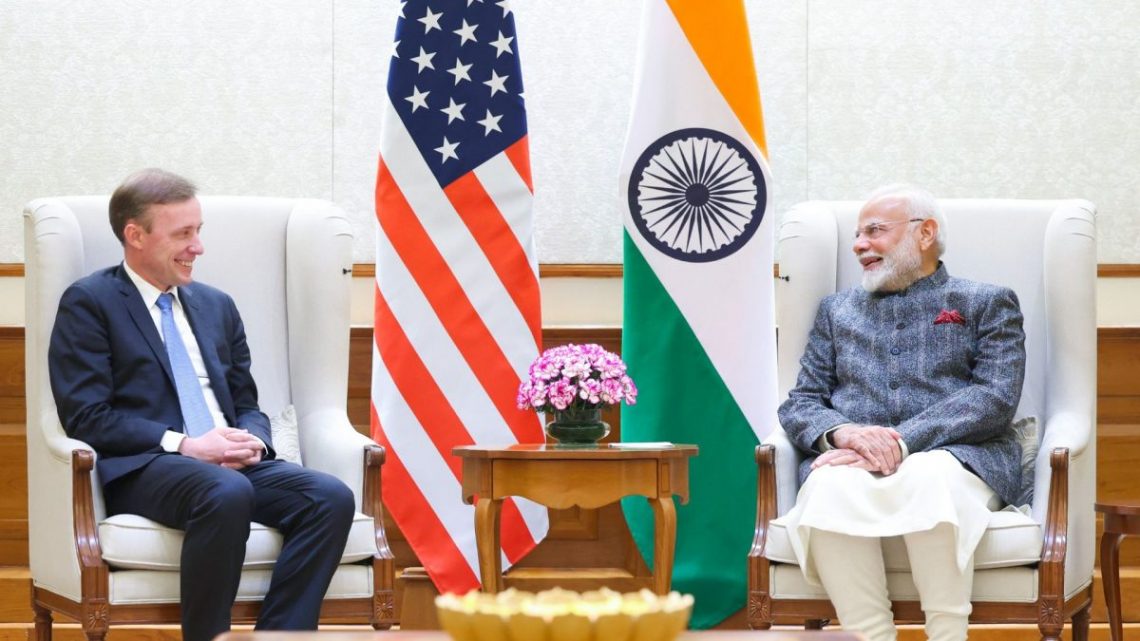As President Joe Biden’s administration prepares to handover the charge to Donald Trump, the United States has announced significant steps to remove long-standing regulations restricting civil nuclear cooperation between India’s top nuclear entities and US companies. US National Security Advisor (NSA) Jake Sullivan described the measures as critical to realising the full potential of the 2008 India-US civil nuclear agreement.
Sullivan was in India from January 5-6 for his final overseas trip before leaving office. During his visit, he met Prime Minister Narendra Modi, India’s NSA Ajit Doval and External Affairs Minister S Jaishankar.
In addition to announcing regulatory changes to enhance nuclear collaboration, Sullivan underscored the deepening India-US defence and technology partnership as a stabilising factor in the Indo-Pacific. He also highlighted the India-Middle East-Europe Economic Corridor (IMEEC) as a promising model for growth and integration, contrasting it with China’s Belt and Road Initiative (BRI).
However, Sullivan issued a measured caution, stating the need for both nations to uphold shared democratic values.
“Respect for rule of law that creates conditions for dynamic growth, respect for pluralism and tolerance that powers innovation, and protection of basic freedoms that unleash the human spirit” are essential for the partnership to reach its “boundless” potential, he stated.
Speaking about steps to delist Indian nuclear entities to foster stronger civil nuclear cooperation, Sullivan announced that formal paperwork is in progress.
“This will be an opportunity to turn the page on some of the frictions of past and create opportunities for entities that have been on restrictive lists in the US to come off those lists and enter into deep collaboration with the US, with our private sector, with our scientists and technologists, to move civil nuclear cooperation forward together,” a report by The Times of India quoted Sullivan as saying at an event at IIT-Delhi.
The US NSA further noted that the Biden administration’s decision to ease these restrictions aligns with broader efforts to advance clean energy technologies, support artificial intelligence development, and foster innovation between US and Indian energy companies.According to a press release by Ministry of External Affairs (MEA), Sullivan and Doval discussed ongoing US efforts to finalise the delisting process, which is expected to promote civil nuclear cooperation and strengthen clean energy supply chains.
Sullivan also updated Indian officials on changes to US missile export control policies under the Missile Technology Control Regime (MTCR). These updates are aimed at boosting commercial space collaboration between the two countries, according to the MEA.
Since the launch of the India-US Initiative on Critical and Emerging Technologies (iCET) in May 2022, significant progress has been made in areas such as artificial intelligence, quantum computing, semiconductors, telecommunications, defense, and space, the MEA release noted.
Sullivan’s visit provided an opportunity to review ongoing initiatives under this framework, including those related to defense, cyber, and maritime security.
As a key architect of iCET initiatives, Sullivan expressed concerns about the transfer of dual-use technologies to Russia. “As we see more and more new technologies diverted to unfriendly actors, the US and India are going to have to ensure that valuable dual-use technologies don’t fall into the wrong hands,” he stated.
Sullivan stressed the importance of aligning export control systems, securing supply chains, and reviewing trade measures to protect sensitive sectors from overcapacity.
“That means aligning our export control systems, looking at trade measures to protect our industrial strategies from overcapacity, better securing our supply chains, and reviewing outbound and inbound investment in sensitive sectors,” he said.
Regarding the India-Middle East-Europe Economic Corridor (IMEEC), Sullivan acknowledged recent disruptions in West Asia but reaffirmed his commitment to the initiative. “I’ve talked to the incoming administration about the enormous opportunity that it presents to deliver both growth and integration and a high standard alternative to what Beijing has on offer,” Sullivan said.
The US NSA noted that he had personally engaged with key leaders and nations to ensure progress on the IMEEC, which he described as an important initiative to promote economic integration and offer a viable alternative to China’s BRI.
Link to article –

